DO-IT News June 2015

Volume 23, Issue 3
Below are the articles of the DO-IT News June 2015 newsletter. These articles can also be seen all on one page at the Full Newsletter option.
Meet the 2015 Scholars!
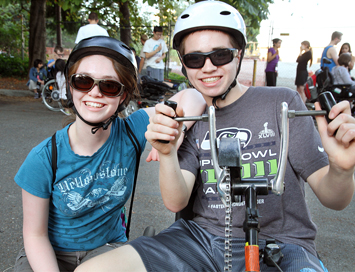
This summer DO-IT will host its twenty-third annual Summer Study program for DO‑IT Scholars, providing participants the opportunity to experience life on a college campus and explore challenging academic and career fields such as those in science, engineering, and computing. Primary funding for the Scholars program is provided by Washington State. For more information, visit www.uw.edu/doit/programs/do-it-scholars.
I am pleased to introduce to you the new Scholars:
Andrew attends Anacortes High School and is deaf. He plays video games, hikes in the mountains, and likes science and nature.
Aspen attends both Edmonds-Woodway and Arlington High School. She is deaf with a cochlear implant. She loves sports and wrestles on her school team.
Brookelyn attends White River High School and has a learning disability and autism. She likes to read, swim, draw, paint, and listen to music. She loves biology and wildlife.
Chana attends Wilson High School in Tacoma. She has cerebral palsy. She likes science and French. She is in Key Club.
Dewald likes history and biology. He attends Bellingham High School and is a varsity wrestler. He has cerebral palsy.
Eli is interested in astronomy, reading, and music, and he likes to play video games. He has Duchenne muscular dystrophy and attends North Thurston High School.
Emily attends Redmond High School. She likes golfing, making art, and making people laugh. She has spastic paraplegia.
Grady has congenital muscular dystrophy. He attends Puyallup High School. He likes computers and other technology. His favorite classes are math and Spanish.
Hailey has ADD and a learning disability. She attends Cheney High School. Her favorite classes are language arts and math. She would like to work with animals.
Jonah attends North Thurston High School. He has Duchenne muscular dystrophy. He is interested in politics, history, video games, and keeping up with the news.
Kaitlyn attends Naches Valley High School. She has cerebral palsy. She enjoys listening to music, drawing, and watching movies. She is an avid writer.
Katelyn has myotonic muscular dystrophy. She attends Bonney Lake High School. She likes hanging out with friends, being on the Internet and listening to loud music. Her favorite classes are English and science.
Laszlo has cerebral palsy and attends Ingraham High School in Seattle. He likes math and science. He would enjoy having his own talk show someday.
London has autism and attends North Central High School in Spokane. He likes video games, fiction, arts, and visual design.
Max attends Camas High School. He has Aspergers Syndrome. He enjoys linguistics, and he likes to play games and take walks. His goal is to create, build, and discover.
Ryan attends Mt. Spokane High School. He likes working out, playing football, singing, fishing, and acting in school plays. He has a learning disability.
Tasha attends Pullman High School where she is a cheerleader and on the wrestling team. She enjoys working out and fitness.
AccessEngineering Holds Its First Capacity Building Institute
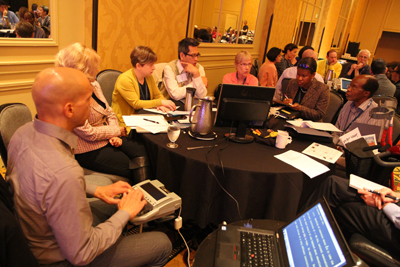
On April 7 – 10, AccessEngineering held its first capacity building institute (CBI) at the Hotel Deca near the University of Washington campus. Over forty attendees from across the country attended the CBI, including postsecondary faculty, students with disabilities, disability service providers, and professional organization representatives. Conversations throughout the event included how to increase the participation of people with disabilities in engineering fields and strategies for including information on disability, accessibility, and universal design into the engineering curriculum.
As part of their work at the meeting, attendees developed resources related to these topics. Watch for these resources to be refined and integrated into the content on the AccessEngineering website over the next few months. In this three-year project, AccessEngineering will hold two more CBIs with stakeholders from across the country in order to advance the goals of the project. To learn more about AccessEngineering and to read more about this CBI, visit www.uw.edu/doit/programs/accessengineering/overview.
DO-IT Ambassador Profile: Brandon Muller
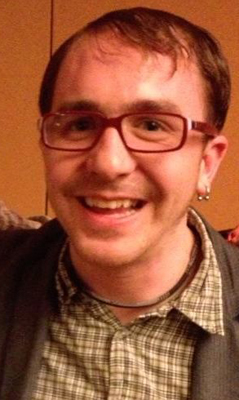
I’ve had a passion for teaching and counseling for as long as I can remember. As a kid, my dream was to teach elementary school children. As I progressed through school, each grade I entered I thought, “This is the grade I want to teach.” At age 13, I sustained a traumatic brain injury, which profoundly affected my life on all levels. I had difficulty navigating high school and life in general, and over the next few years, programs like the Youth Leadership Forum (YLF) and DO-IT made a big impact in my life. They helped shape my perspective of what it means to have a disability and helped me maintain confidence in my potential for a bright future. The information I gained about accommodations, self-advocacy, assistive technology, and leadership were all instrumental in my academic and vocational success.
In college, I studied elementary and secondary English education, as well as psychology. I earned my bachelor of liberal arts from Evergreen State College and my master of education in counseling from University of Puget Sound. I am now an instructor in the Achieve Program at Highline College. I absolutely love my job, which allows me to do intensive academic advising, teaching, and career coaching. After graduate school, I reconnected with the Governor’s Committee for Disability Issues and Employment and volunteered the last two summers as a member of the YLF planning committee as well as a counselor during YLF. I recently was appointed to the Governor’s Committee and also to co-vice chair of the YLF sub-committee. I am very excited to be involved in shaping the future for people of all abilities.
Disability in the Media: Daredevil and Accessibility Issues
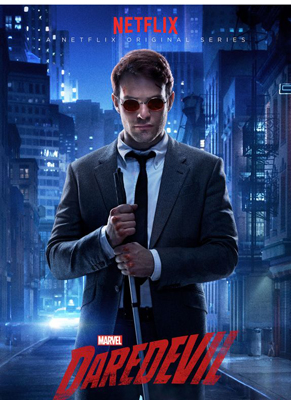
Last month, I eagerly consumed the entire season of Netflix’s original series, Daredevil. I have always loved superheroes, and Daredevil, who is blind, captured my attention long ago.
The main character, Matt Murdock (Daredevil), became blind after an incident involving a chemical spill when he was a child. The accident gave him superhuman senses and the ability to navigate the world in a different way. Matt is a lawyer by day and a vigilante by night, using his powers to protect the crime ridden neighborhood of Hell’s Kitchen. His story is lovely and complex, as he works inside and outside the law to bring justice to the world. I was happy with how well the television series was written.
As it turns out, a lot of people agree with me. However, one group of people wasn’t given the chance to watch and form an opinion. Daredevil did not provide audio descriptions, leaving people with visual disabilities unable to watch the show. This would be comical if it wasn’t tragic; since the show features a blind character, Netflix should have put some thought into making it accessible.
According to the American Council of the Blind, audio descriptions make television, movies, and other art forms accessible to people who are blind, have low vision, or are otherwise visually impaired: “It is a narration service that attempts to describe what the sighted person takes for granted—those images that a person who is blind or visually impaired formerly could only experience through the whispered asides from a sighted companion.”
As far as movies go, studios have been increasing the amount of movies that include audio description in home release, and more theaters have gained the correct equipment for using audio descriptions. Of last year’s Oscar nominees for best feature, seven of the films were audio described. In an interview with Kim Charlson, the President of the American Council of the Blind, she appreciated the audio descriptions in The Theory of Everything, a movie based on Steven Hawking’s story. “As the character has his disability progress, he speaks less, there’s more things happening visually, and the description was so important to really understanding the struggles he was going through,” she said.
But what about television? The FCC has regulations for broadcast television, which include requiring a certain number of hours of audio described television. However, Netflix is not a broadcasting company; they do not have those requirements. Many blind activists began rallying online to raise awareness of the fact that Netflix doesn’t have audio descriptions. Some are even advocating for more online material to be required to be audio described. A lot of advocates promote the idea that where the Internet is considered a public space or a place of business, like Netflix’s streaming service, the Americans with Disabilities Act should apply.
Netflix quickly responded to this issue and added audio descriptions to Daredevil within a week. Netflix also said that it intends to make other original series, including Unbreakable Kimmy Schmidt, House of Cards, Orange Is the New Black, and Marco Polo accessible in the future.
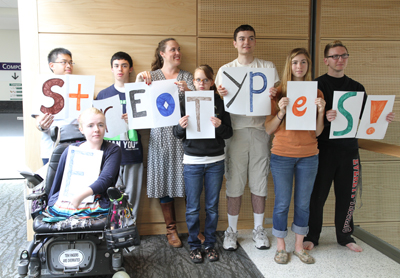
While it is great that Netflix responded to this particular case, we still have to look at this from the wider perspective. The fact is that people with visual impairments do not have the same access to media as most due to this lack of accessibility. It is great having a mainstream superhero with an apparant disability, but when people with disabilities can’t access his story, it isn’t super at all.
For more information on audio descriptions or the issues described in this article, visit the Audio Description Project (adp.acb.org/movies.html), read about the Oscars and audio description (wgbhnews.org/post/how-those-whove-lost-vision-watch-films), or listen to NPR discuss Daredevil (http://www.npr.org/sections/monkeysee/2015/04/17/400157297/pop-culture-happy-hour-daredevil-and-credulity).
AccessComputing and AccessCSForAll Represented at SIGCSE
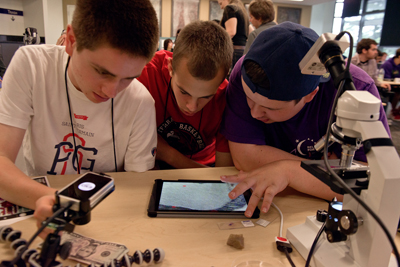
AccessComputing and AccessCSForAll were well represented at the 2015 SIGCSE (Association for Computing Machinery Special Interest Group on Computer Science Education) Technical Symposium on March 5–7 in Kansas City, MO. Both projects disseminated information about increasing the participation of students with disabilities in computing education in the exhibit hall.
In addition, AccessCSForAll ’s principle investigators, Richard Ladner and Andreas Stefik, led a special session titled “Introduction to AccessCSForAll and Accessible Tools for Teaching Programming.” The session focused on K-12 education and ways to help teachers include students with disabilities in their classrooms. Attendees participated in a hands-on experience with the Quorum language, a programming language designed for youth regardless of disability. To experience Quorum for yourself, visit https://quorumlanguage.com/hourofcode/part1.html.
AccessComputing also held a Birds of a Feather discussion titled “Universal Access to Computing Education” that was attended by postsecondary faculty, students, and individuals with disabilities. Discussion focused on methods to support students with disabilities, resources to assist these efforts, and ways to partner with AccessComputing.
DO-IT Promotes #NoMouse Challenge for Global Accessibility Awareness Day
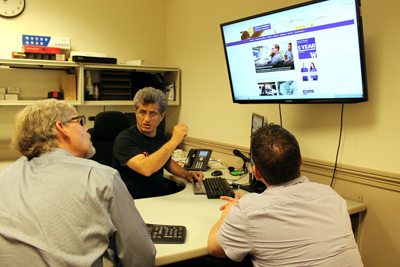
Global Accessibility Awareness Day (GAAD) serves to get people talking, thinking, and learning about digital accessibility and users with different abilities. This year, DO‑IT and the Access Technology Center (ATC) are sponsoring the #NoMouse Challenge, an initiative to raise awareness about accessible web design.
The #NoMouse Challenge was featured at the ATC open house on May 21, 2015, where people from across campus came in to learn what the ATC and other service organizations on campus offer to students, faculties, and staff with disabilities. Hadi Rangin, DO-IT’s IT Accessibility Specialist, offered individualized website consultations, and ATC staff demonstrated a variety of accessible hardware and software. Samples of braille and tactile graphics were also distributed.
To take the #NoMouse Challenge, use your organization’s website with a keyboard alone. Visit nomouse.org for a variety of tips and questions to ask as you navigate, or to find out more about making your website accessible. The day after GAAD, nomouse.org had been viewed 1,682 times and, according to hashtracking.com, #NoMouse was tweeted 109 times, reaching 72,000 people.
The Thread: Disability in STEM Classes
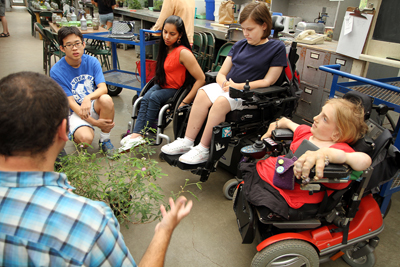
I wanted to share with you a question posed by DO-IT Staff in our Internet discussion forum and some of the responses so that you can get the flavor of the many rich conversations the DO-IT community has online. This thread inspired the academic paper “Including Universal Design in Engineering Courses to Attract Diverse Students,” presented at the American Society for Engineering Education Annual Conference and Exposition. Forum posts are edited for clarity and brevity.
What, if anything, have you learned in your science, technology, engineering, and math (STEM) classes about disability or accessibility? How did you feel about it? If you haven’t had information about disability or accessibility in your classes, how do you think faculty members could have addressed one or both of these topics?
AccessSTEM Team Member: I never hear a word about disability in any of my classes. Instructors always put in the politically correct statements about disability accommodations but class content never includes disability.
AccessSTEM Team Member: I have a feeling that there will be a consensus for many of us that disability rights, accessibility, awareness, or even knowledge of disabilities are not being taught in our STEM related fields. This makes it our responsibility to educate faculty, so they can learn how to interact with students with disabilities and provide accessible assignments. We need to lay the foundation for future students with disabilities to be seen as equals and not just minorities.
AccessSTEM Team Member: In one of my graduate classes, my professor let me teach the entire class period about assistive technology. Jon Sanford, the director of the Center for Assistive Technology and Environmental Access on our campus, even got the school to pay for a vendor to complete a universal design assessment of our entire campus. We have a class on web accessibility, and I guest lecture on assistive technology for the prosthetics program. However, I know most professors have very little knowledge on how to work with people with disabilities. This is why a lot of the burden falls on the part of the student. I was the first totally blind student at my school, and I hope I am paving the way for other students with disabilities.
AccessSTEM Team Member: I learned nothing about disability or accessibility in my STEM classes. I was always the one to bring it up. I had some final projects in grad school where it was important to me to create accessible materials, but faculty or my classmates often thought I was being ridiculous. I think the reason for many accessibility-related issues in today’s technology is because accessibility isn’t taught in academia. If it isn’t taught, folks continue to create new inaccessible products.
DO-IT Ambassador: None of my classes have taught about accessibility, and my school seems opposed to becoming accessible. None of my textbooks were accessible until weeks into class, and the programs I needed to do math online or program were inaccessible. The school did nothing to address these issues. They actually told me to consider leaving and going to another college.
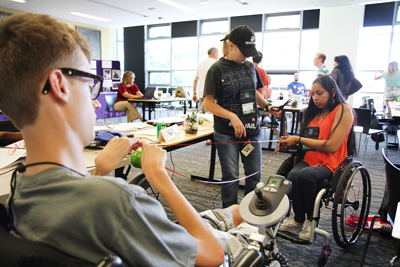
It sounds like there is very little discussion about disability in STEM curriculum. We have discussed encouraging engineering and computer design courses to include a unit on designing accessible products. Would you be interested in seeing this sort of information in a course?
DO-IT Ambassador: I would be interested in seeing information on accessibility in a course. There are multiple places where it could be applied. In a programming course that teaches Java or HTML, there could be a unit on how to write accessible software applications and web pages. Math and science books could include instructions on accessible ways to represent equations and a chart on keyboard commands for representing math symbols in Word.
AccessSTEM Team Member: It really should be a part of all STEM courses because that is where it will reach the greatest number of students and have the largest impact.
AccessSTEM Team Member: If it is not taught at the design level, people will never learn it.
AccessSTEM Team Member: As a computer science major at Stanford, I have generally found most professors to be understanding, and most will go out of their way to make sure I have the technology I need. We have an engineering class dedicated to assistive technologies, which satisfies a number of engineering requirements. Stanford also offers a class called “Social Perspectives on Disability.” However, I definitely think there is always room for improvement, and a lot of teachers still use inaccessible technology and documents.
DO-IT Scholar: When I was in high school, I had more science-based STEM classes, including a biotechnology class. Disability was mentioned, but the instructors always focused on the medical model of disability, which focused on curing people to make them “normal.”
AccessSTEM Team Member: I know my college offers accessible technology training webinars, but I don’t know how many professors take them. I think adding AT to the school’s curriculum would be an excellent way of assuring future educators and students are knowledgeable on the subject.
DO-IT Scholar: If disability gets included in the curriculum, my overall concern is the portrayal of it. People often seem to exaggerate or poorly portray disability, and if professors base their knowledge off of media sources, I’m afraid stereotypes may become worse.
DO-IT Ambassador: I agree that teachers need to be careful how they portray disabilities—I don’t want students pitying people with disabilities, just becoming more aware of accessibility.
DO-IT Scholar: I’d like to see more awareness, positive attitudes, and accessible information about disabilities as they pertain to technology. What bothers me about accessible design is that people with disabilities are rarely consulted or considered. There is not enough disability awareness within scholarly fields or the general public.
Call For Articles
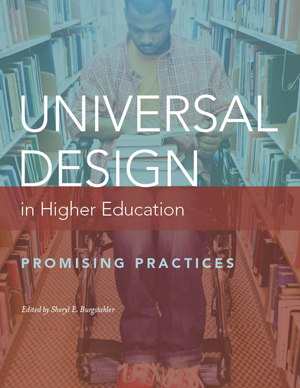
In DO-IT’s online publication, Universal Design in Higher Education: Promising Practices, practitioners share promising practices related to the application of universal design in postsecondary education settings. This collection of promising practices complements the more general content in the printed book, Universal Design in Higher Education: From Principles to Practice, published by Harvard Education Press (http://hepg.org/hep-home/books/universal-design-in-higher-education).
The new publication is available freely online at www.washington.edu/doit/resources/books/universal-design-higher-education-promising-practices. It can be freely copied and distributed as a book or in part for noncommercial, educational purposes. The collection will continue to grow as more articles are submitted.
Articles may be submitted at any time to udhecop@uw.edu. Submitted articles should include specific ways practitioners and researchers have applied universal design in postsecondary settings along with evidence of success. They are peer-reviewed by members of the Universal Design in Higher Education Community of Practice (udhecop@uw.edu), and if accepted, edited by DO‑IT. Articles selected for the online resource are freely available on our website. Authors must agree to these conditions while retaining copyrights to their individual contributions. For author guidelines, consult the preface of the book at www.washington.edu/doit/preface-0.
About DO-IT
DO-IT (Disabilities, Opportunities, Internetworking, and Technology) serves to increase the successful participation of individuals with disabilities in challenging academic programs and careers, such as those in science, engineering, mathematics, and technology. Primary funding for DO-IT is provided by the National Science Foundation, the State of Washington, and the U.S. Department of Education.
For further information, to be placed on the DO-IT mailing list, request this newsletter or other materials in an alternate format, or make comments or suggestions about DO-IT publications or web pages, contact:
DO-IT
University of Washington
Box 354842
Seattle, WA 98195-4842
doit@uw.edu
www.uw.edu/doit/
206-685-DOIT (3648) (voice/TTY)
888-972-DOIT (3648) (toll free voice/TTY)
509-328-9331 (voice/TTY) Spokane
206-221-4171 (fax)
Founder and Director: Sheryl Burgstahler, Ph.D.